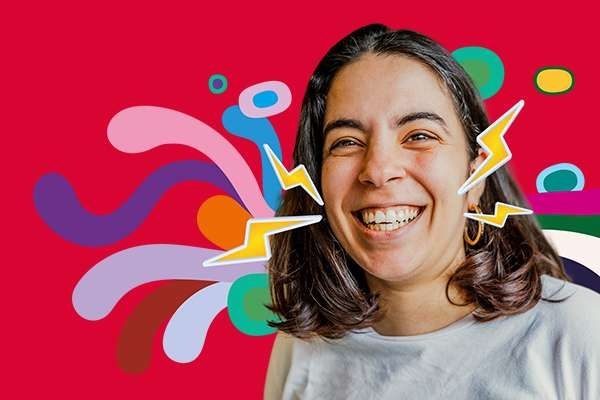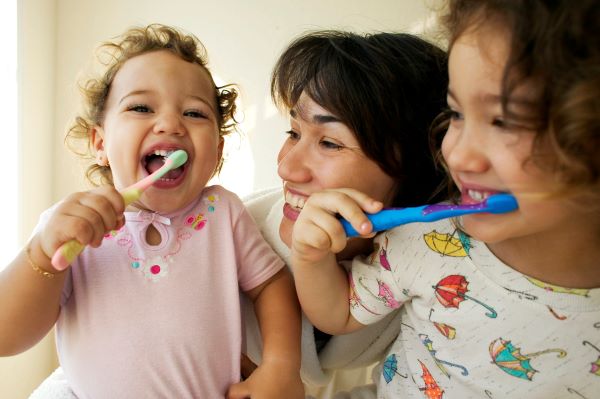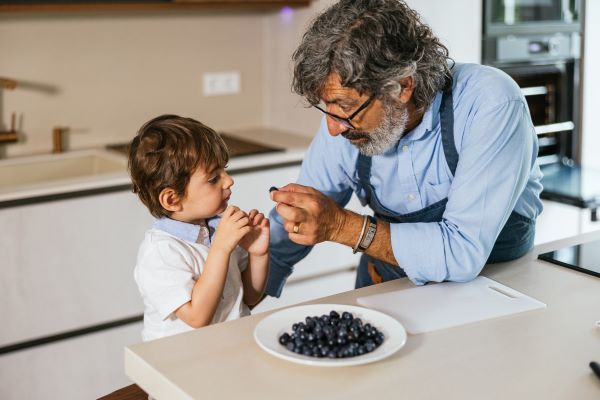As the principal dentist at Surrey Hills Family Dental Clinic, Dr Cristina Dumitrache has helped guide many parents to care for their children's teeth. Here, Dr Dumitrache answers some common questions about how to care for children's teeth and gums.
When should I start brushing my baby/child’s teeth?
Before your baby has teeth, you can gently wipe their gums with a soft, warm cloth each night. Once your child’s first tooth erupts, you should brush it with a soft-bristled children’s toothbrush and water (no toothpaste yet), twice a day.
At around 18 months of age, use a smear of children’s fluoride toothpaste (about the size of a grain of rice) until age 3, then a pea-sized amount of toothpaste until age 6. Rinsing with water right after brushing can wash away the protective fluoride left by the toothpaste. Instead, encourage your child just to spit out the excess toothpaste and allow the fluoride to remain on the teeth for some time to enhance its effectiveness in preventing cavities.

Teeth. You’d literally suck without them.
Our 100% back on dental check-ups are just one of the ways you can get great value from our extras covers. Learn more about how extras cover can help you take control of your health & wellbeing.
Any tips on brushing a baby or toddler’s teeth?
- Use a small, soft-bristled toothbrush designed for infants or toddlers.
- Hold the toothbrush at a 45-degree angle and brush gently in small, circular motions.
- Make it fun. Sing songs or make brushing a game to encourage cooperation and make it enjoyable.
- You can allow and encourage your child to brush their own teeth, however, you should monitor them and help them brush all the areas of their teeth up to 8 years of age.
- Be consistent. Brush your child's teeth twice a day, for two minutes, ideally after breakfast and before bedtime.
- The Australian Dental Association generally recommends switching to adult toothpaste when a child is around 6 years old.
Should children floss?
Yes! Flossing helps remove plaque and food particles from between teeth and under the gumline, promoting good oral hygiene and preventing cavities and gum disease. Generally, children should be flossing regularly by the age of two and a half years (that’s when most children have all their baby teeth erupted). However, if your child has teeth that have erupted closely together, you should start flossing earlier. Usually, the back molars require the most attention as they can be hard to reach and they are normally closer together. Be patient, as supervision and assistance may be needed until your child can floss effectively on their own.
At what age should I book in my child’s first dental check-up?
The Australian Dental Association recommends booking a child's first dental check-up by the age of 1 or within 6 months of the eruption of the first tooth, whichever comes first. This early visit allows the dentist to monitor oral health development and provide guidance on proper dental care practices for infants and toddlers. This visit also helps your child get used to a dental check, and it should be repeated every 6 months.
When do baby teeth start to fall out?
Everyone is different, and this may vary from child to child. Usually, baby teeth start to fall out between 6 and 7 years of age. The lower central incisors (the middle bottom teeth) are generally the first to fall out. This process continues until around the age of 12 or 13.
How long does a wobbly tooth stay wobbly before it usually falls out?
It depends on the child. This can take a few days, a few weeks or, in some cases, up to a few months. If you notice that your child has an adult tooth that is erupting before its predecessor has become mobile, you should arrange a dental appointment so your dentist can assess.
When should I be worried when a missing tooth doesn’t grow back?
Sometimes, permanent teeth are already partially erupted when the baby tooth comes out, however, this varies. It can take up to 6 months for a permanent tooth to erupt. Six monthly visits to the dentist can help identify various underlying issues such as developmental problems or impacted teeth that may require intervention.
Will the new teeth be different?
Compared to the baby teeth, permanent teeth are larger, have a different shade, and have different shapes. It's common for there to be some variation, but significant differences may warrant a dental consultation to ensure proper dental development. Another difference to note is that a child has 20 baby teeth, whereas the adult dentition comprises of 32 teeth.
How can I tell if my child needs braces?
If you are concerned with misaligned teeth, difficulty biting or chewing, early loss of baby teeth, thumb sucking habits, or protruding teeth, your dentist can assess your child’s teeth at one of your six monthly dental appointments. At around 6 years of age, a child’s jaw starts to grow which results in the baby teeth becoming spaced out. If your child’s baby teeth still appear close together, this may be an early sign of crowding.
When is the best time to get braces?
Individual factors such as dental development and the specific orthodontic needs of the child are considered when placing braces. Braces are usually placed on the child’s adult teeth. This usually happens between the ages of 9 and 14 when most of the permanent teeth have erupted but is not limited to this age range. Early intervention may sometimes be recommended for certain orthodontic issues. For example, your child may be given an expander (a type of plate) at an early stage to help their jaw grow and reduce the amount of crowding. The need for braces and expanders is assessed by your dentist and orthodontist, and if your child is not comfortable with braces, other successful treatment options are available.






